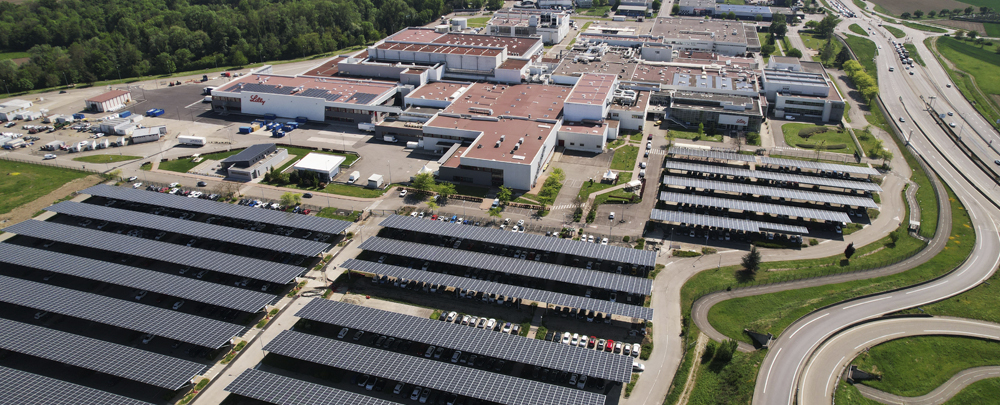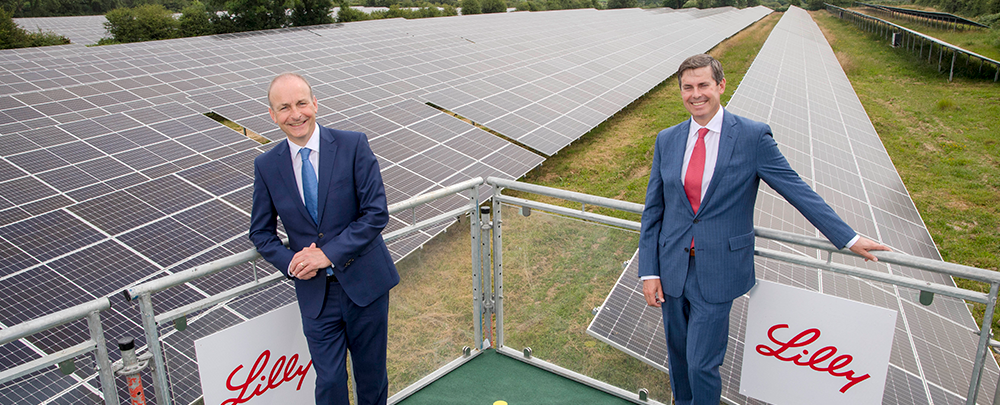Expanding Our Use of Solar Energy at Our Global Facilities
January 3, 2023 Posted by: Eli Lilly and Company

Catching Rays with Solar Superpowers in France
Our colleagues in France recently held an inauguration ceremony for its new solar canopy in Fegersheim. Within a full year of operation, the solar array is expected to produce around 12 percent of the manufacturing site's electrical energy needs through sustainable power.
The solar array extends our Fegersheim facility’s ongoing efforts to minimize its carbon footprint and work towards carbon neutrality. The canopies are integrated with solar panels and have a capacity of 4 megawatts (MW) and a total energy production capacity of about 4,550 megawatt hours (MWh) a year.
But the sustainable effort doesn't stop with solar canopies. Each year, Lilly's affiliates look for opportunities to enhance their environmental performance and lower greenhouse gas (GHG) emissions. Our Fegersheim plant also installed 72 new charging ports for employees' electric vehicles (EVs). Providing this EV infrastructure positions Lilly France to optimize fuel-efficient options and travel means for our employees, as the facility can now sustain more hybrid and electric vehicles.
An added renewable power project is in the pipeline for our Fegersheim plant to install more solar panels on the site grounds, increasing the renewable power generation capacity from 4 MW to 5 MW. Located south of Strasbourg, with Swiss and German neighbors, the region is known for its strong work ethic and scientific potential -- invaluable assets for our production of injectable medicines.
Read more about other Lilly renewable energy efforts including Ireland’s electric vehicle fleet.

Lilly Solar Farm in Ireland Reducing Carbon Emissions
At Lilly, we are always looking for new and better ways to minimize our environmental footprint. Solar energy will be essential to achieving Lilly's 2030 environmental goals, announced in February 2021. Using solar photovoltaic (PV) cells to expand renewable electricity use will diversify our energy sources and, over time, decrease our greenhouse gas emissions.
As a result of our efforts, Lilly has been approved to join RE100, a global corporate renewable energy initiative led by the Climate Group which brings together hundreds of large-scale businesses committed to 100% renewable electricity. Sam Kimmins, Head of RE100 at Climate Group noted, “Eli Lilly’s commitment to 100% renewable electricity by 2030 demonstrates its leadership in the energy transition.”
Officially opened on July 20, 2021, Kinsale's PV ground-mounted project was the single largest solar farm at the time of installation in the Republic of Ireland. Lilly partnered with Enerpower, which designed, built, and will maintain the farm and will receive support from the Sustainable Energy Authority of Ireland. With sustainable energy, the 16-acre farm will help power a significant proportion of the Lilly plant at its Dunderrow site near Kinsale, County Cork.
Eamon Judge, Senior Director in Lilly’s Global Engineering, was the initiator of the solar farm project and notes that the project is in a very inconspicuous area relative to the adjacent manufacturing site. Despite the rolling green landscape of Ireland, the solar farm is hidden and surrounded by tall brush hedges. "The feedback from the community was positive after we shared some of the outputs from the generational data around the carbon emphasis," Judge said.
The solar farm is only three miles from the site of the 1601 Battle of Kinsale, a clash of historical significance which resulted in England’s conquest of Gaelic Ireland.
"Though we didn't find any archaeological interests related to the battle, such as shields or musket balls, archaeological investigations for previous campus developments have uncovered some archaeological remains in areas adjacent to the solar farm, such as an old wooden horizontal grain mill and cooking areas which date to circa 500 BC.," said Judge. "We like to say Lilly has been manufacturing at Kinsale for 40 years, but manufacturing [because it was a grain mill] has been happening on this site for over 1,000 years."
Read more about how Lilly is trying to minimize our environmental impact
Ireland's prime minister Micheál Martin presided over the opening of the solar farm. "The Lilly name has long been synonymous with Cork and Ireland, having had a presence here for four decades. With the opening of their new solar farm and extension to their biotech facility they are again demonstrating their ongoing commitment to Cork and to Ireland."
"Lilly is delighted to partner with Enerpower on this state-of-the-art solar facility and acknowledge the support of the Sustainable Energy Authority of Ireland to help bring this project to fruition," said Dave Ricks, Lilly's chair and CEO. "We're proud of our team in Kinsale for their contributions over the past 40 years to produce medicines that make life better for millions of people around the world."
“The farm is fully operational and will generate almost 6.0 GW hours of power over a year" Judge said. "To give you a reference point of what that's worth in terms of carbon reduction, it's approximately 2,350 tons of carbon, and in the case of a forestry equivalent, it would probably take on the order of 5,000 acres of trees to reduce that much carbon.”
A statement from Chair and CEO David A. Ricks about sustainability at Lilly
It's worth noting that the land is viable for farming. A flock of forty sheep owned by a local farmer graze under the solar panels. "Some people call them sheep - we call them our automatic grass maintenance team," joked Judge. Plans are also in the works to add beehives and to plant clover in the solar field to attract bees.
An additional 10 acres of solar panels are being added adjacent to the current Kinsale solar farm and will be operational in the second half of 2022.
Lilly's commitment to utilizing renewable energy continues at Lilly's Fegersheim plant near Strasbourg, France, where construction is underway on a 4,500kW PV array project. Two new solar arrays - one mounted on carport roofs and the other on the ground——are expected to begin generating electricity in late 2022. These panels will also power electric vehicle charging stations.
In Alcobendas near Madrid, Spain, a 390kW PV array recently installed on the rooftops of three Lilly buildings should generate about 4 percent of overall energy consumption on campus.
Construction has begun on the 2,000kW solar array at the del Caribe, Puerto Rico site. The installation, which will include a 200-kilowatt battery, is scheduled to generate energy for the facility in late 2022. Solar arrays are in use at Lilly facilities in Sesto, Italy and Gurugram, India, the West Coast Biotechnology Center in San Diego, Calif., and the Branchburg, N.J. facility. Lilly is also investigating potential locations for solar PV arrays at our Indianapolis facilities.
